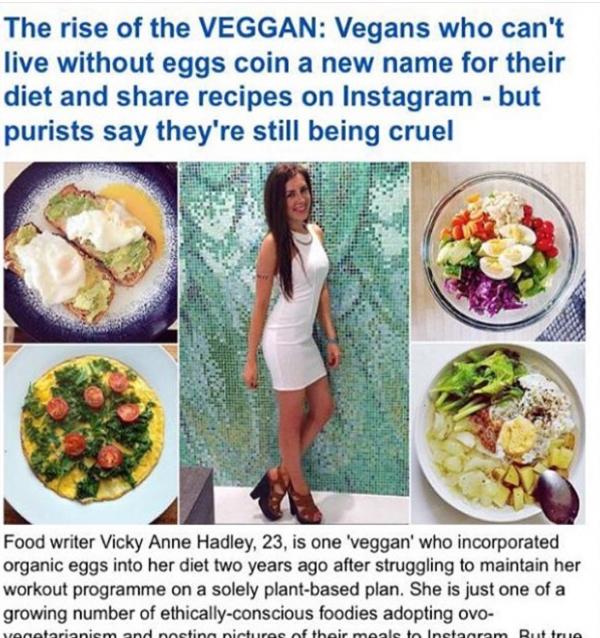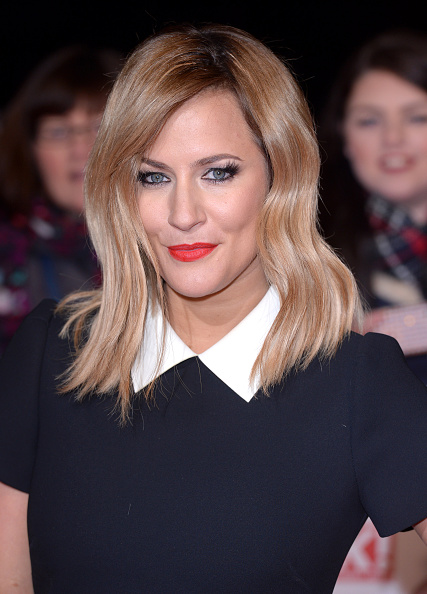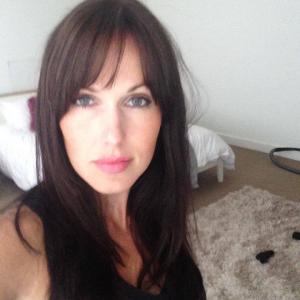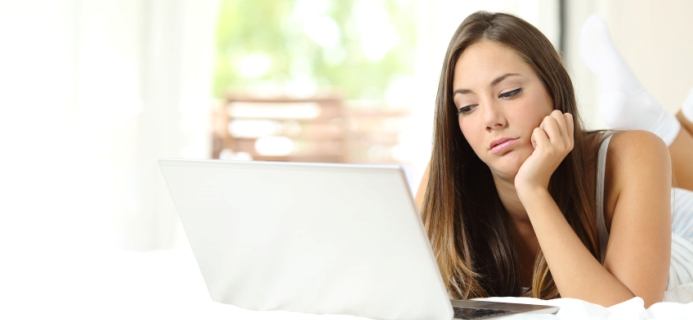Healthista writer, Vicky Hadley was recently exposed to cyber bullying after being featured in a newspaper article so she asked Healthista therapist Sally Brown how to cope
I was recently featured in the Daily Mail about being a ‘veggan’ (a vegan that eats eggs). I agreed and sent across my reasons for following an ovo-vegetarian (now known as a veggan) diet. I am allergic to gluten, dairy, nuts and choose to avoid meat so am limited in what and where I can eat. I still include the occasional egg (from back yard chickens that are kept as pets) in my otherwise plant-based diet as not only do I enjoy the occasional egg but it is another source to get protein from in my very active lifestyle. Not knowing that the article would spark such a burning debate, I willingly sent across some of my photographs to the journalist as well as some of my recipes that included eggs.

Within half an hour of the article going live, I had received message after message from friends telling me they had seen me all over the news. I clicked on the article as I got home and sure enough there I was. Laughing with my friends about the fact I had quickly become the ‘face of the veggan’ and cracking egg jokes soon took a serious toll. Scrolling down to look at the comments at the bottom of the article there were hundreds of purists and vegans leaving comments deeming me the worst human in the world, or a disgusting person that is not vegan. I decided to stop reading the comments knowing full well people would have an opinion either way.
there were hundreds of purists and vegans leaving comments deeming me the worst human in the world
The next morning I awoke to 168 Instagram comments, 45 new followers and three tagged photographs. The comments on my personal Instagram feed ranged from purists lecturing me about how evil I am, to people commenting on photographs of my hair saying, ‘This is why your hair is so bad, it’s because you eat eggs!’. One Instagram user even went so far as to screen shot my personal photo and label me a ‘chicken abuser, masquerading as a faux vegan’, where one hundred followers of their account had swarmed together to call me a bitch or a slut.
Even my work’s social media accounts were being targeted, it seemed that no matter where I was the cyber bullying was going to continue. Trying to work whilst my phone was flashing up continuously with notification after notification proved exceptionally hard. I couldn’t listen to what people were saying as I was so paranoid about deleting the comments and blocking the users before anyone else saw them, my entire day was consumed by Instagram. As the day ended I assumed the comments would stop but unsurprisingly it continued into the next day. The article now has 5000 shares, which I have a strong suspicion are mostly angry vegans.
One Instagram user screen shot my personal photo and label me a ‘chicken abuser, masquerading as a faux vegan’
After being in the firing range for two days it made me wonder how celebrities can deal with this every single day of their lives? I can handle people picking faults at my diet or physique or hair because I’m confident enough as a person that I know it is untrue and just a matter of opinion, but for many people it is harder to turn a cold shoulder to the abuse. A survey by The Cyber bullying Research Center found that about half of young people have experienced some form of cyber bullying, and 10 to 20 percent experience it regularly.

Caroline Flack, dealt with thousands of abusive comments from One Direction fans during her relationship with lead singer, Harry Styles. The television presenter was subjected to insulting tweets and threatening pictures including a 1D fan that sent a photo of herself holding a knife and another that tweeted, ‘I want to kill you Caroline Flack’.

Channel 4 First Dates star, Abi Mills, 34 was also in the firing line late last year after being portrayed as the worst date in the world. ‘I felt hurt, humiliated, I lost my confidence and doubted myself’, Abi Mills told Healthista. ‘I was scared to leave the house and when I did I kept my head down and looked at the floor,’ Mills said. ‘I read the comments over again and again believing the words I was reading,’ she explained.
‘I cried and I hugged my kids pleased they weren’t old enough to understand,’ Mills said. So how did she get through it? ‘I sought comfort in the people who knew me best, my friends and my family,’ she explains. ‘I coped by talking to people about it and I slowly realised none of it actually mattered and none of it was actually real’, Mills said. ‘I’m grateful for the experience now as it has made me stronger and wiser, when you’ve hit rock bottom there is only one way you can go’, Mills revealed.
What is the best way to deal with cyber bullying?

‘Your logical mind may be telling you not to take any notice of the trolls, but the amygdala, the oldest part of the brain, registers the abuse as a threat, and triggers the ‘flight or fight’ response, increasing the levels of stress hormones’, Brown reveals. ‘Receiving daily abuse puts you in a state of chronic anxiety, which is a big risk factor for depression,’ she explains.
Your logical mind may be telling you not to take any notice of the trolls, but the amygdala, the oldest part of the brain, registers the abuse as a threat
Is it common for people to ignore and obsess over the internet abuse? ‘Absolutely, most of us would never expect to shrug off abuse if it was shouted at us in the street or at work, yet we expect ourselves to be unaffected by internet abuse,’ Brown says. ‘But to protect your mental wellbeing, you need to take it seriously, and reduce your exposure to the abuse to protect your mental wellbeing, by coming off social media until it dies down,’ she asserts. ‘I know this isn’t always easy. Even when the abuse is upsetting us, there can be a compulsive element to re-reading it, like picking at a scab’, Brown says.
Even when the abuse is upsetting us, there can be a compulsive element to reading it, like picking at a scab
‘The brain has a natural ’negativity bias’, which means it pays more attention to negative events than positive ones, as in evolutionary terms, these were more likely to harm us’, she explains. ‘That’s why we may even feel that we will ‘learn something’ or ‘gain insight’ into ourselves from the abuse’, Brown says. ‘But in reality, all it does is undermine your self-confidence and your self-image’, she explains. ‘You can start to lose sight of who you are and whether you really are a good person’, Brown conveys.
The brain has a natural ’negativity bias’, which means it pays more attention to negative events than positive ones
So, what can we do to get through it?‘As well as coming off social media until the abuse dies down (and reporting the abuse to the relevant site administrators), I would advise you do an ‘abuse detox’, by spending extra time with people who support and love you,’ Brown suggests. ‘There is a theory that we need to have five positive interactions for every negative one to maintain mental wellbeing – so be sure to be extra kind to yourself during this time, and do nice things’, she says.
Like this article? Sign up to our newsletter to get more articles like this delivered straight to your inbox.





















































